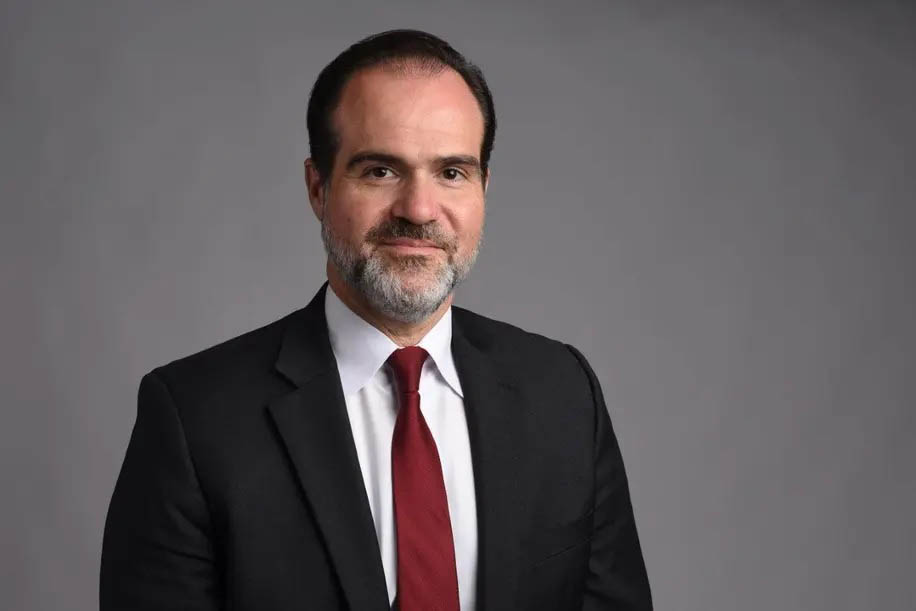GYSBI has disputed a claim made yesterday by IDB President Mauricio Claver-Carone that financing of its oil and gas shore base had been turned down in October last year over design concerns.
Claver-Carone made this contention at an Inter-American Development Bank (IDB) media roundtable in response to a question from Stabroek News.
He said that the Guyana Shore Base Incorporated’s (GYSBI) US$130m loan proposal was rejected by the Board of the IDB because of design concerns but that the bank was still working with the company and the Guyana Government as it revisits the project.

Claver-Carone’s statement drew a sharp denial yesterday from GYSBI. Emails seen by Stabroek News last night underlined that the last-minute rejection of the loan application had been due to the purpose of the expansion loan which was to provide oil and gas shore-based services.
GYSBI said it wanted it to be made clear that the redesign specified to them by the bank was to have a project objective not in support of the oil and gas sector, advice that it could not take since it already has an active contract with ExxonMobil’s subsidiary, Esso Explora-tion and Production Guyana Limited (EEPGL) for logistics support services.
GYSBI’s Chief Financial Officer Robert Albiez yesterday told Stabroek News “When they are talking about the design of the project, they are not talking about the actual design or engineering design of the project, they are talking about how it is being used. They asked us to reframe the structure and the commercial arrangement so it was not solely in support of oil and gas. They wanted us to be able to demonstrate that parts of the project was not for oil and gas…,” he contended.
“We received full environmental, commercial and full engineering legal, and due diligence sign- off from the IDB. They went to the Board and it was rejected by the US because of their non-support for oil and gas development,” he added.
In December last year, Bloomberg had reported that the Biden administration had issued directives barring US government backing for future oil and gas ventures and this extended to multilateral financial institutions where Washington had a presence. It is this directive that GYSBI believes was responsible for the collapse of the loan and not a design issue as was contended yesterday by Claver-Carone.
In email correspondence from October 19, 2021, an IDB official told GYSBI “This is not about the financial capacity of GYSBI. It’s 100% about GYSBI’s support to Exxon. For example, if GYSBI committed to dedicating two berths to cargo that we could argue would create a bigger impact for Guyana (beyond Exxon), we might be able to make an argument. But obviously you are not going to be doing that”.
Another correspondence from the IDB on November 4, 2021 in response to questions from Albiez stated “Yes, that’s exactly right Robert. The policy of the Bank in this case (alignment in 2023) is not totally aligned with the new policies/guidelines of certain members of our Board, which are countries and which can’t approve financing of projects with oil and gas connections via multilateral development banks like IDB Invest (starting about a month ago).
“We had a number of meetings this week with members of the Board. We will meet with our senior Management early next week when they return from Glasgow (COP26 Climate Meeting) to decide whether we will submit the project again for consideration by the Board, and if so, what changes we would need to make, if any…”
GYSBI yesterday said that it was not currently working along with the IDB to get the financing it requested as it was made clear to it that the project, which the company worked on arduously for two years alongside the IDB and which met all the requirements then set out, could not be approved.
Specifically
At the media roundtable yesterday, Claver-Carone said “The one project you are talking about, specifically did not, as designed, did not pass our Board’s approval. A similar Suriname project did and we are planning on revisiting that Guyana project. I think it is all about the timing and the design of the project and we are working very closely with that company in Guyana and with the Guyana Government to be able to redesign the project so that it meets some of the concerns that some of the members of our Board of Directors had so that we could move that through”.
He added: “IDB is fully committed to helping Guyana with its overall logistics and transportation and infrastructure needs in this regard, so that it can really take advantage of this historic milestone in their development opportunities and it can be done right and be done in a sustainable and inclusive fashion,” he added.
This newspaper reached out yesterday to Minister of Finance Dr.Ashni Singh for comment on the financing and he said that government “welcomes the willingness of the IDB to keep this project under consideration and to reformulate it and take it back to their Board in a manner that will secure approval, should the company decide to go this route.”
The Finance Minister said that government has long been advocating the cause of the multinational and regional development banks providing greater support at scale to the private sector through their respective private sector arms.
“Indeed we actively encourage private investors to approach these financial institutions with good bankable projects. We remain committed to working closely with potential private sector borrowers and the multilateral and regional development banks, with a view to more such projects being successfully realized, in the interest of private sector expansion and national development,” Singh said.
Claver-Carone, a former senior director at the US National Security Council and a former senior advisor at the U.S. Treasury Department, said that he was optimistic that the project would go through, once the changes are made.
“So we are going to be working closely with them. I am very optimistic in this regard and I think we are seeing here. You know, we have an opportunity to frankly walk and chew gum at the same time,” he said.
Holistically
Claver-Carone, who yesterday also said that he does not believe that Guyana should be “punished” for discovering its oil resources long after first world countries had exploited theirs and was moving to renewables, assured that the IDB will work with this country to ensure its citizens benefit holistically from its newfound sector.
“We are going to be able to work with Guyana, companies, investors, and others to ensure that all the projects there serve to really ensure that this historic time that Guyana is going through, with its newfound energy resources, that it can be done so with a sustainable inclusive fashion. That it can…first and foremost, benefit the citizens of Guyana and their development needs and in an inclusive fashion,” he said.
“We are going to design and continue to work with them to present again this project in a manner that addresses some of the concerns that some of our Board members had and I am optimistic on it,” he added.
Last Friday, GYSBI Executive Director Robin Muneshwer told this newspaper, in an interview, that the United States used its voting power in October on the Board of the IDB to deny the company the loan after it had gone through a two-year approval process, a move that he said has grave implications for Guyana’s developmental trajectory.
The company had approached the IDB for financing to facilitate its expansion plans to service the growing oil and gas sector and went through all the regulatory phases.
The summary of the proposal, submitted in April of last year, stated that the company was seeking the support of the IDB to refinance certain existing bridge loans, expand GYSBI’s port and shore base facilities through the construction of four additional berths, increase the size of the Shore Base logistics support area, develop and construct an infill project that would allow offloading of heavier cargo, purchase and construct a waste management facility, install rooftop solar photovoltaic (PV) capacity to meet GYSBI’s energy needs, and construct additional warehouse capacity.
The company submitted to the IDB not only its expansion proposals but an Environmental Assessment and Environment Management Plan had already gotten approval from the Environmental Protection Agency.
This Environmental Assessment (EA) addressed the proposed improvements to the Port’s transport and logistics improvements and acknowledged that the Project could also potentially lead to “negative environmental and social impacts during its construction and operation.”
A US$10 million solar power project was also included in the proposal and that was voted down as well.






